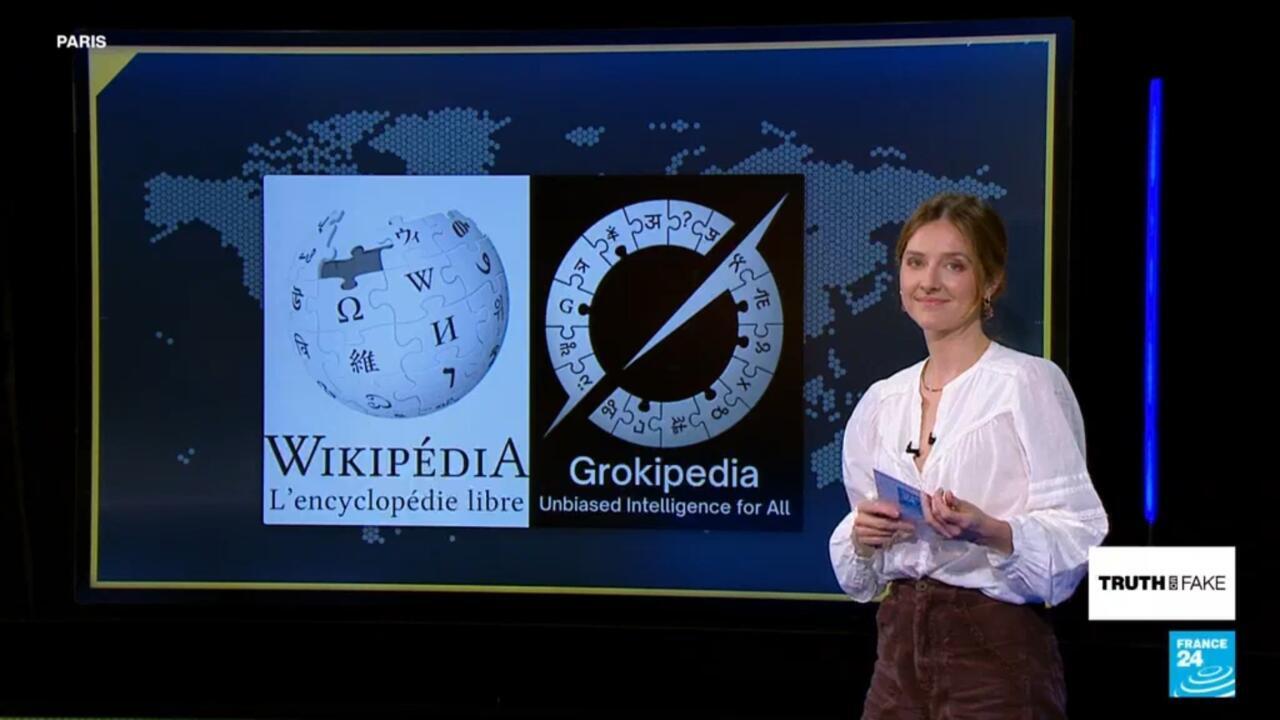Wikipedia aimed to make knowledge free to the public, but now Elon Musk is challenging that model. The US billionaire, who has repeatedly accused Wikipedia of left-wing bias, launched his own more “objective” online encyclopaedia, Grokipedia, on October 27.
Founded in 2001, Wikipedia has become the largest free source of knowledge online, with editions in more than 300 languages that are written and updated by thousands of volunteer editors and contributors. It is funded by donations from online users.
For Musk – and more broadly for US conservatives – this compendium of knowledge is no longer a resource for learning, but a bastion of “woke” thinking that must be torn down.
In a post on his social media site X, Musk describes his new encyclopaedia as “purged of propaganda” – powered not by volunteers but by artificial intelligence.
As its name suggests, Musk is relying on Grok – the AI chatbot integrated into the X social media platform – to produce content for his new online encyclopaedia.
The Grokipedia project is a sign that Musk’s ambitions extend to trying to impose an AI-generated version of the truth.
Read moreMusk chatbot Grok says it was 'censored' after suspension from X over Gaza posts
‘A machine for discrediting scientific and collaborative work’
When Musk described his biography entry on Wikipedia as “insanely inaccurate” in 2019, his criticism seemed of little consequence. But the Tesla and SpaceX boss was already showing signs of questioning the validity of the collaborative model on which Wikipedia is based.
Co-founded by Jimmy Wales and Larry Sanger nearly 25 years ago, Wikipedia had lofty aims. As Wales wrote: “Imagine a world in which every single person on the planet is given free access to the sum of all human knowledge. That's what we're doing.”
Contrary to this open-source, collaborative view of knowledge, Musk advocates a hierarchical, technological approach, where knowledge is no longer built through human collaboration, but is “purified” through algorithms.
In the case of Grokipedia, fact-checking is done by Grok, Musk’s AI chatbot.
Can Musk's AI-generated 'Grokipedia' be trusted?
To display this content from YouTube, you must enable advertisement tracking and audience measurement.
One of your browser extensions seems to be blocking the video player from loading. To watch this content, you may need to disable it on this site.

05:16
Musk had become openly confrontational toward Wikipedia by 2023, accusing it of “taking public money to fund ideological propaganda”. In a puerile move to discredit it, he offered the platform $1 billion to change its name to “Dickipedia”.
A year later, after buying the X social network in 2022, he asked his more than 200 million followers to stop donating to “Wokepedia”, as he called the online encyclopaedia.
Musk baselessly claimed that the Wikimedia Foundation – the non-profit that hosts Wikipedia – was "controlled by far-left activists" and slammed it for devoting nearly $50 million of its $177 million budget for the 2023-24 fiscal year to diversity, equity and inclusion policies.
Read more100 posts a day: Who does Elon Musk target on X?
In the summer of 2025, following a US presidential campaign during which he accused Wikipedia of misinformation and anti-conservative bias, Musk announced the launch of his own encyclopaedia. In interviews, he discussed his ambition to “purify knowledge” through technology, in contrast to the “human chaos” of Wikipedia.
Not everyone is convinced.
Musk’s AI-based encyclopaedia “discredits scientific and collaborative work” said Anaïs Nony, a researcher on digital technologies and their impact on society at the University of Johannesburg in South Africa.
More than just a sign of Musk’s antipathy to Wikipedia, Grokipedia epitomises the aim “to transition from collective knowledge to algorithm-driven knowledge”, Nony says.
The promise of ‘purified’ knowledge
According to Musk, Grokipedia aims to produce “pure”, objective knowledge, free from human passions and compromises.
But Nony said that “rationality is created precisely by our relationships, by the way we confront reality and change things as we go along”.
“Wikipedia is an open system, while Musk's project is closed, omnipotent, above the crowd, god-like,” she said.
According to the Washington Post, several studies have examined potential liberal biases of Wikipedia. Some find it leans slightly to the left, while others place it in the centre in the context of US politics, and suggest that, over time, articles become more neutral thanks to revisions by contributors.
“It is an encyclopaedia that relies on underlying sources, that gets fixed in real time, and that is constantly changing, and the sources are constantly changing,” Maryana Iskander, executive director of the Wikimedia Foundation, told the Washington Post. “There’s no bias on Wikipedia if one understands how it works.”
Read moreEurope’s leaders have had enough of Musk’s meddling, but can they stop him?
When announcing the launch of Grokipedia, Musk repeatedly stated that “AI doesn't care about ideology, it cares about accuracy”.
But Nony explained that in the case of an online encyclopaedia powered by artificial intelligence, the idea of any kind of neutrality is completely illusory.
“The design, deployment and functionality of a technology reflect the aspirations and values of its creator," she said. "There is no such thing as neutral technology, just as there is no such thing as neutral science. It is always biased.”
According to Nony, Musk is promoting a platform that cannot be modified by peers, which is the antithesis of what constitutes knowledge.
“The very basis of knowledge is interpretation, dialogue with peers, and confronting false results in order to arrive at better ones,” she said.
Musk's social media chatbot Grok praises Hitler
To display this content from YouTube, you must enable advertisement tracking and audience measurement.
One of your browser extensions seems to be blocking the video player from loading. To watch this content, you may need to disable it on this site.

05:22
The algorithms themselves have built-in standpoints “rooted in biases” including gender, race and class, she notes.
In other words, AI systems reproduce the biases of the data on which they are trained. In Grok's case, these data sources come mainly from X and from an ideologically biased data set.
"AI systems are neither autonomous nor rational, nor capable of discerning anything without intensive training in computation with large data sets or predefined rules and rewards,” Australian researcher Kate Crawford noted in her book Atlas of AI.
‘Neoliberal and colonial continuity’
Nony says Musk’s claims are part of his own ideological crusade.
"Saying that Wikipedia is ‘woke’ and ‘biased’ is just an excuse," said Nony, arguing that the billionaire was using it as a pretext “to promote neoliberal, highly patriarchal ideologies and divide along racial lines”.
Musk is looking into “rewriting history and sociology – but without sociologists and historians”.
Instead of filtering information, Musk’s Grokipedia is cleansing it, with the algorithm becoming a new invisible editor, serving the worldview he promotes.
According to Wired magazine, which had access to Grokipedia on Monday, “a number of notable entries denounced the mainstream media, promoted conservative viewpoints and sometimes perpetuated historical inaccuracies”.
Wired noted that the Grokipedia entry about the slavery of African Americans “includes a section outlining numerous 'ideological justifications' made for slavery” .
Wired said it searched for “gay marriage” and found that no page existed on the subject. Instead, Grokipedia suggested consulting a page on "gay pornography”, in which it “falsely states that the proliferation of porn exacerbated the HIV/AIDS epidemic in the 1980s”.
Watch moreMusk's Grok falsely accuses police of spreading disinformation about far-right rally in London
Crawford noted in her book that “artificial intelligence as we know it depends entirely on a much broader set of political and social structures".
"And because of the capital required to build large-scale AI and the ways of seeing that it optimises, AI systems are ultimately designed to serve existing dominant interests," she wrote.
In the case of Grokipedia, “Elon Musk's project is part of the neoliberal and colonial continuity of what had already been started with Starlink satellites and later with social network X," Nony said.
“The idea is, in one case, to secure a kind of hegemony of Internet access on the planet in order to create dependency. And in the other, to create a machine to propel the Musk-Trump ideology.”
At a time when the far right accuses universities of indoctrination, the mainstream media of promoting “fake news” and scientific institutions for being “captured by wokism” – and now Wikipedia denounced for “leftist bias” – Grokipedia seems to be just another Orwellian tool for controlling “truth”.
And in this new era of algorithm-driven knowledge, knowledge is no longer shared – it is owned.
This article was translated from the original in French.











 English (US) ·
English (US) ·